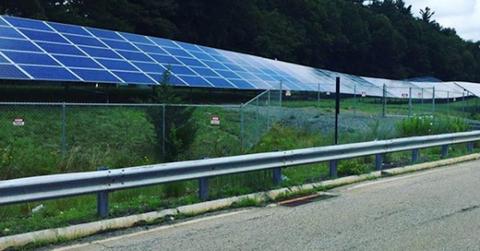A Company Is Trying To Build The First 'Sustainable Highway'
The Ray is a small stretch of highway in Georgia that is showing the potential for some big ideas.
Updated May 17 2019, 4:19 a.m. ET
Near the town of West Point, Georgia, an organization is supporting a length of road in an exciting experiment. Fast Company reports that the project is called The Ray, and it's an attempt to see if it's possible to build a sustainable highway. Located in a fairly rural area, The Ray's experiments with sustainable technology have been noted for their remarkable innovation.
The Ray is working with several solutions for how to make a stretch of road battle climate change. One road shoulder generates energy with a small solar farm.
In another section, they've used "solar pavement" over 50 square meters, a relatively new technology that is being developed all over the world.
But one of the most exciting technologies is actually a very old one. The Ray is lining its borders with a perennial grain called Kernza, and other plants that are longer-lasting than grass, which don't require mowing or replanting. Kernza in particular has extremely long roots that go almost ten feet underground, preventing soil erosion and absorbing far for carbon from the soil.
Allie Kelly, executive director of The Ray, told Fast Company that Kernza has never been grown in the Southeast, and its success could be a game changer.
If we are successful, this plant has very deep root systems that will be much more viable and resilient to sun exposure and drought and other changing climate conditions–much more resilient on the roadside than grass, which is what is normally sown and maintained on the shoulder,” she explained.
Theoretically, Kernza could also eventually be used as a food source, though current levels of pollution mean that the Kernza they're growing roadside could potentially be sold to paper companies. Grass is much more of a drain on local tax payers, as lawn clipping shave no resale value and its upkeep is expensive. Of Kernza were developed as a common roadside plant, it could give back to the community. The Ray wants to show how their project can be both economically and environmentally sustainable.
“We have to pierce the veil of the transportation sector and inject more technology and innovation,” Kelly said. “We still are following some of the same methods of construction and maintenance that we’ve been using since we starting building the interstate system back in the ’50s and ’60s. You’ve got to get the technology on the road in a working public environment to show people that it’s real and that these technologies exist. It’s here now. We don’t have to wait any longer.”
And imagine what a difference solar pavement and sustainable plantings would make along all of America's highways.
